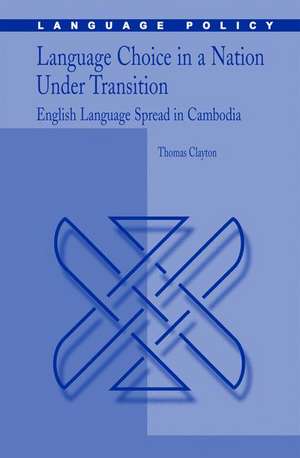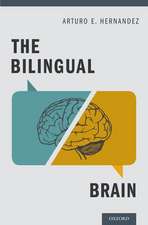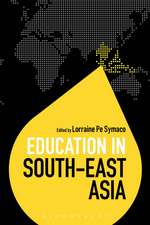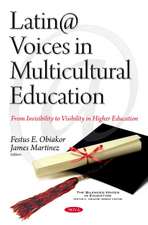Language Choice in a Nation Under Transition: English Language Spread in Cambodia: Language Policy, cartea 5
Autor Thomas Claytonen Limba Engleză Hardback – 26 ian 2006
| Toate formatele și edițiile | Preț | Express |
|---|---|---|
| Paperback (1) | 891.33 lei 43-57 zile | |
| Springer Us – 11 feb 2011 | 891.33 lei 43-57 zile | |
| Hardback (1) | 650.04 lei 43-57 zile | |
| Springer Us – 26 ian 2006 | 650.04 lei 43-57 zile |
Din seria Language Policy
- 24%
 Preț: 804.41 lei
Preț: 804.41 lei - 18%
 Preț: 885.63 lei
Preț: 885.63 lei - 18%
 Preț: 1009.08 lei
Preț: 1009.08 lei - 24%
 Preț: 776.31 lei
Preț: 776.31 lei - 18%
 Preț: 775.30 lei
Preț: 775.30 lei - 15%
 Preț: 641.71 lei
Preț: 641.71 lei - 15%
 Preț: 634.32 lei
Preț: 634.32 lei - 18%
 Preț: 740.25 lei
Preț: 740.25 lei - 15%
 Preț: 643.16 lei
Preț: 643.16 lei - 15%
 Preț: 642.68 lei
Preț: 642.68 lei - 18%
 Preț: 1118.75 lei
Preț: 1118.75 lei - 24%
 Preț: 753.11 lei
Preț: 753.11 lei - 15%
 Preț: 647.40 lei
Preț: 647.40 lei - 18%
 Preț: 785.42 lei
Preț: 785.42 lei - 18%
 Preț: 949.23 lei
Preț: 949.23 lei - 18%
 Preț: 895.58 lei
Preț: 895.58 lei - 15%
 Preț: 645.47 lei
Preț: 645.47 lei - 24%
 Preț: 689.39 lei
Preț: 689.39 lei - 15%
 Preț: 642.83 lei
Preț: 642.83 lei - 15%
 Preț: 648.89 lei
Preț: 648.89 lei - 15%
 Preț: 635.80 lei
Preț: 635.80 lei - 15%
 Preț: 634.32 lei
Preț: 634.32 lei -
 Preț: 389.70 lei
Preț: 389.70 lei - 18%
 Preț: 1106.79 lei
Preț: 1106.79 lei - 24%
 Preț: 787.79 lei
Preț: 787.79 lei - 18%
 Preț: 1111.97 lei
Preț: 1111.97 lei - 24%
 Preț: 738.97 lei
Preț: 738.97 lei - 15%
 Preț: 700.29 lei
Preț: 700.29 lei - 18%
 Preț: 895.27 lei
Preț: 895.27 lei - 18%
 Preț: 889.60 lei
Preț: 889.60 lei - 18%
 Preț: 953.97 lei
Preț: 953.97 lei
Preț: 650.04 lei
Preț vechi: 764.76 lei
-15% Nou
Puncte Express: 975
Preț estimativ în valută:
124.42€ • 135.20$ • 104.58£
124.42€ • 135.20$ • 104.58£
Carte tipărită la comandă
Livrare economică 21 aprilie-05 mai
Preluare comenzi: 021 569.72.76
Specificații
ISBN-13: 9780387311937
ISBN-10: 0387311939
Pagini: 309
Ilustrații: X, 310 p.
Dimensiuni: 155 x 235 x 25 mm
Greutate: 0.69 kg
Ediția:2006
Editura: Springer Us
Colecția Springer
Seria Language Policy
Locul publicării:New York, NY, United States
ISBN-10: 0387311939
Pagini: 309
Ilustrații: X, 310 p.
Dimensiuni: 155 x 235 x 25 mm
Greutate: 0.69 kg
Ediția:2006
Editura: Springer Us
Colecția Springer
Seria Language Policy
Locul publicării:New York, NY, United States
Public țintă
Professional/practitionerCuprins
The Economic Context for Language Choice.- The Political Context for Language Choice.- The Assistance Context for Language Choice.- The Assistance Context for Language Choice.- The Assistance Context for Language Choice.- Language Choice in a Nation Under Transition.- English Language Spread.
Notă biografică
Thomas Clayton is Associate Professor of English and Linguistics at the University of Kentucky, U.S.A., where he teaches classes in applied linguistics and directs the Master of Arts in English with a Concentration in Teaching English as a Second Language Program. Professor Clayton has published more than two dozen articles on language and educational policy issues, often in the Cambodian context, in books and journals. In 1991, Clayton established the first U.S. university educational program in postwar Cambodia, the English Language Teaching Center for the State University of New York at Buffalo at the Cambodia Development Resource Institute. In 2000, he taught at the Faculty of Law and Economics in Phnom Penh as the first-ever Fulbright scholar to Cambodia.
Textul de pe ultima copertă
This book examines language choice in contemporary Cambodia, and uses the case study to explore and evaluate competing explanations for the spread of English globally.
Following the introduction, the multiple contexts in which Cambodians make individual and institutional language policy choices are considered. Chapters 2 and 3 examine the economic and political contexts for language choice, as Cambodia has transitioned from a planned economy and communism to a market economy and democracy. Chapters 4, 5, and 6 examine the assistance context for language choice; the bilateral, multilateral, and nongovernmental development agencies that have recently begun to work in Cambodia demand certain language skills of Cambodian employees and government counterparts, and support the learning of these languages in both nonformal and formal education.
Individual and institutional languages choices Cambodians are making in economic, political, assistance, and educational contexts are described. Some Cambodians have chosen to learn French, making language policy decisions supportive of French language learning, in anticipation of education offered in French at universities locally and abroad. More Cambodians are studying and learning Chinese to procure jobs with firms owned or managed by Chinese speakers. A great many have chosen to learn English and to support English language learning in education. These decisions respond to the multiple demands and opportunities for employment with economic and assistance enterprises associated with virtually every nation or group of nations, for regional and international political communication, and for education in the global infrastructure of English-language universities.
Having thus contextualized and described Cambodians’ contemporary language choices, the case study is applied to a theoretical debate in the field of language policy studies. The specifics of the Cambodian case fully confirm neither the"language choice" nor the "linguistic imperialism" explanation for the global spread of English. Rather, in Cambodia English is spreading as a result of both choice and promotion, it integrates with (though is not integral to) the contemporary global restructuring of the world, and has introduced results that, though aggregating toward amelioration, run the gamut from beneficial to exploitative for groups of Cambodians located variously along geographical, socioeconomic, ethnic, and other spectra.
Following the introduction, the multiple contexts in which Cambodians make individual and institutional language policy choices are considered. Chapters 2 and 3 examine the economic and political contexts for language choice, as Cambodia has transitioned from a planned economy and communism to a market economy and democracy. Chapters 4, 5, and 6 examine the assistance context for language choice; the bilateral, multilateral, and nongovernmental development agencies that have recently begun to work in Cambodia demand certain language skills of Cambodian employees and government counterparts, and support the learning of these languages in both nonformal and formal education.
Individual and institutional languages choices Cambodians are making in economic, political, assistance, and educational contexts are described. Some Cambodians have chosen to learn French, making language policy decisions supportive of French language learning, in anticipation of education offered in French at universities locally and abroad. More Cambodians are studying and learning Chinese to procure jobs with firms owned or managed by Chinese speakers. A great many have chosen to learn English and to support English language learning in education. These decisions respond to the multiple demands and opportunities for employment with economic and assistance enterprises associated with virtually every nation or group of nations, for regional and international political communication, and for education in the global infrastructure of English-language universities.
Having thus contextualized and described Cambodians’ contemporary language choices, the case study is applied to a theoretical debate in the field of language policy studies. The specifics of the Cambodian case fully confirm neither the"language choice" nor the "linguistic imperialism" explanation for the global spread of English. Rather, in Cambodia English is spreading as a result of both choice and promotion, it integrates with (though is not integral to) the contemporary global restructuring of the world, and has introduced results that, though aggregating toward amelioration, run the gamut from beneficial to exploitative for groups of Cambodians located variously along geographical, socioeconomic, ethnic, and other spectra.
Caracteristici
Provides a very detailed, empirical case study of the spread of English. Many books on English language spread induce conclusions from scant empirical data The focus of the book on language choice and policy will appeal to scholars in comparative education, where language and language policy studies represent a growing area of research interest In general terms, studies of Cambodia are of interest to Cambodian and Asian studies scholars and due to its research foci: language and education policy Most books published on Cambodia tend to focus on political history Includes supplementary material: sn.pub/extras









